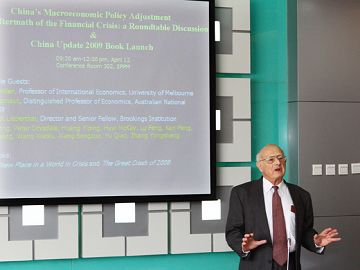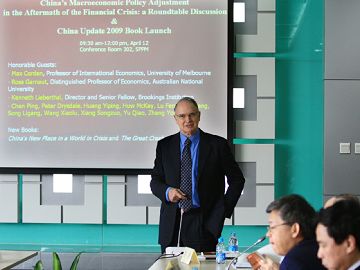On the morning of April 12, 2010, the Brookings-Tsinghua Center for Public Policy and the Australian National University (ANU) co-hosted a roundtable discussion on “China’s Macroeconomic Policy Adjustment in the Aftermath of the Financial Crisis” and the book launches of China’s New Place in a World in Crisis and The Great Crash of 2008 as part of China Update 2009. The books were published by the ANU E Press, Brookings Institution Press, and the Social Sciences Academic Press (SSAP) of the China Academy of Social Sciences (CASS).
Geoff Raby, Australian Ambassador to China and Kenneth Lieberthal, Director and Senior Fellow, John Thornton China Center, Brookings Institution delivered opening remarks for the event.
Max Corden, Professor of International Economics at the University of Melbourne, and Ross Garnaut, Distinguished Professor of Economics at the Australian National University gave keynote speeches on China’s exchange rate policy choices, and the causes of the financial crisis, in addition to the implications of China’s economic development on its macroeconomic adjustment.
Professor Max Corden spoke on various methods of appreciating the Chinese currency as a means of solving its current account surplus situation, in addition to alternate ways of solving China’s current account surplus situation. He also discussed the interconnectedness of national economies and stated that what is good for China is, in general, good for the rest of the world. He suggested China should do what is in its best interest, despite outside pressures to appreciate.

Professor Ross Garnaut discussed the causes of the financial crisis and implications for the future of China and the world. He spoke on national deficits, expansionary monetary policies, trade imbalances, complex financial instruments and the absence of proper adjustments which allowed problems to build up over time, especially during the boom period just before the crash. He emphasized that the crisis was more severe due to imbalances in the world economy and the important role that China will play in the long-term future developments post-crisis. With regards to China specifically, he discussed its growing geopolitical influence and the limited future of cheap labor in the country.

Panelists in the roundtable discussion also included Huang Yiping, Professor of Economics, Peking University, Lu Feng, Professor of Economics, Peking University, Huw McKay, Senior International Economist at Westpac Banking Corporation, Ken Peng, Economist, Citigroup, Wang Xiaolu, Senior Fellow, National Institute for Economic Research, Yu Qiao, Professor of Finance, Tsinghua University, and Zhang Yongsheng, Senior Fellow, Development Research Center, the State Council.